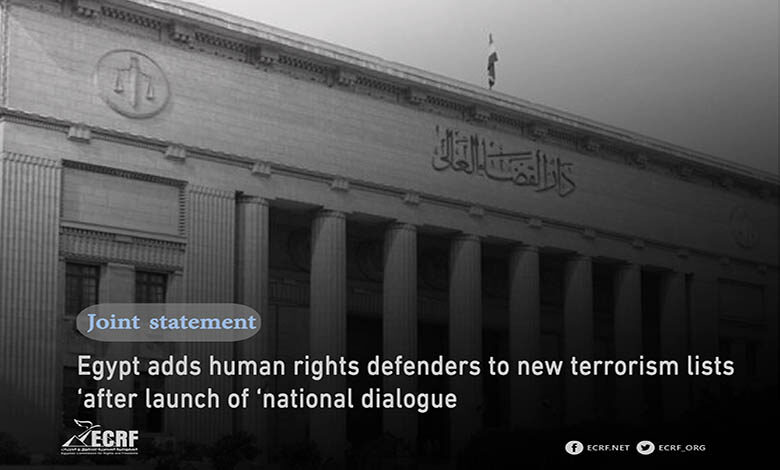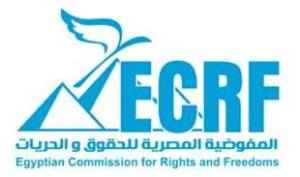Egypt adds human rights defenders to new terrorism lists after launch of ‘national dialogue’

The undersigned human rights organizations condemn the decision of the 13th Circuit of the Cairo Criminal Court to include 81 Egyptians on terrorism lists for a period of 5 years, including human rights defenders and political activists.
The decision reflects the judiciary’s continued involvement in political disputes. Additionally, the decisions to include individuals on these lists are not limited to perpetrators of violent crimes, as required by the law and indicated by the recommendations of the United Nations, but rather expand to become a tool for revenge against politicians, opposition figures, and human rights activists because of their opinions. This undermines all claims of dialogue, acceptance, and communication with the opposition and other slogans claimed by the government-sponsored “national dialogue” that kicked off in Cairo last week.
In addition, the procedure is arbitrary in itself and constitutes a violation of the basic human rights of defendants who have not yet been proven guilty, or those who have been convicted under trials lacking the guarantees of a fair trial and whose independence is questionable. This is also a continuation of the current government’s oppressive approach that transcends borders and is used to silence opposition figures abroad.
On 14 April, the Egyptian Official Gazette published a decision to include 81 individuals on terrorism lists for five years, followed by the freezing of their assets and a travel ban on them. Among those listed were Mosaad el-Barbari, the director of the Haqqohom (Their Right) campaign, Iman Mohamed Gad el-Haq, a human rights defender working for the Sinai Foundation for Human Rights, and Shorouk Amgad, a human rights defender at the Committee for Justice.
The decision is based on loosely worded legal texts and broad definitions of terrorism in the terrorist entities law. Article 3 of the law defines the crime of terrorism financing as “financing an organized individual or collective terrorist activity, inside or outside [the country], whether the terrorist act has occurred or not.” This allows the judiciary to impose penalties for crimes that have not yet been committed, solely based on security investigations that claim the existence of an intention to commit what is believed to be a terrorist crime. UN experts previously expressed their grave concern, in a memorandum sent to the Egyptian authorities on August 13, 2021, about these practices that are based on security investigations and punishment for “intent to commit a crime,” in addition to the fact that the overly broad and erroneous interpretation of the crime of terrorism necessarily means not meeting the requirements of necessity and proportionality. UN experts have previously warned against the use of such legislation to suppress opposition and restrict the work of human rights defenders, journalists, and opposition parties. Such legislation and decisions represent a tool to restrict freedom of expression, the right to form associations, and the right to peaceful assembly.
The use of arbitrary and retaliatory inclusion on terrorism lists against peaceful citizens raises serious and alarming concerns about the legal and administrative tools used by the current Egyptian government to suppress freedom of expression and association. Former parliamentarian Ziad el-Elaimy and activist Ramy Shaath were added to these lists in April 2020, in addition to political activist Alaa Abdel-Fattah and human rights lawyer Mohamed El-Baqer in November 2020. Furthermore, Abdel-Moneim Aboul-Fotouh, the leader of the Strong Egypt Party, and his deputy Mohamed El-Qassas were added to the same lists in May 2022.
The human rights organizations that have signed this statement renew their condemnation of the decision of the Criminal Court, and reject this persecution and revenge against the opposition and civil society as a whole. This is accompanied by campaigns of defamation, terrorism labelling, freezing of assets, and travel bans. The organizations demand that the names of all human rights and political activists on these lists be removed, and that the authorities in Egypt compensate the victims whose names were listed without fulfilling the conditions and standards of fair trials, which caused them significant material and moral losses and damages. They also call for the suspension of the inclusion of individuals and entities on terrorism lists until a comprehensive, accurate, and transparent review of terrorism legislation and laws is conducted.
The signatories:
Committee for Justice
Cairo Centre for Human Rights Studies
Sinai Foundation for Human Rights
Egyptian Front for Human Rights
Egyptian Commission for Rights and Freedoms
Freedom Initiative
Egyptian Initiative for Personal Rights





